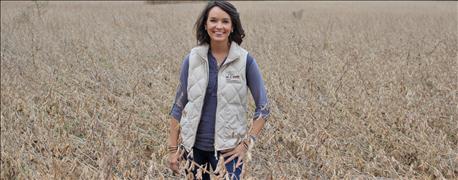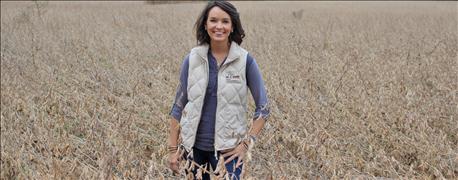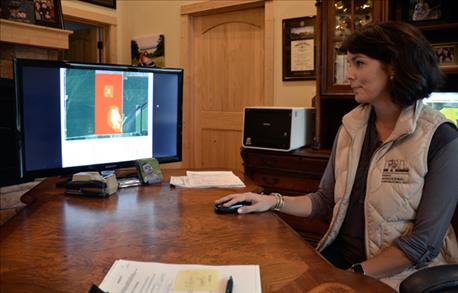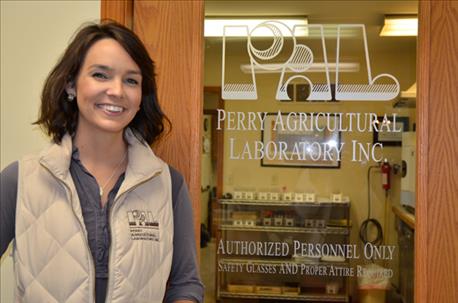
As the sun sets in northeast Missouri, Meagan Kaiser walks out into a soybean field that is awaiting harvest. Running her hand over the tops of the plants, she sees beyond the light brown stems and pods into to the science, the soil and the sale.
At just 30 years of age, Kaiser's agricultural experiences have taken her to the East Coast and brought her back to the Midwest. She studied plant and soil science in college and steered legislation in Washington, D.C. This year, she will take her knowledge and put it to use in hopes of making a positive impact for soybean production in America as a member of the United Soybean Board.

SELECTED TO SERVE: Meagan Kaiser is one of 15 new directors appointed to the United Soybean Board by USDA Secretary Tom Vilsack. She the first woman from Missouri to be appointed to the board and will begin her work in December.
Kaiser is one of 15 new directors appointed by USDA Secretary Tom Vilsack. She is the first woman appointed from Missouri. However, influencing agriculture was not always at the top of her life goals.
FFA influence
Growing up in Bowling Green in northeast Missouri, she was surrounded by agriculture. However, fine arts were her passion. "I loved singing," she says. As a middle school student, she set a career goal to major in music in college. But when the time came to enroll in classes in high school, her older brother told her about the FFA.
"He said, 'You know, the FFA has a choir,'" she recalls. Her family was involved in the agriculture industry, so she decided to take her passion for music to the agriculture masses. She participated in state and national FFA Chorus, as well as FFA talent. But that was not all. "I got hooked on FFA," she says.

ANALYZING DATA: Taking time for the family business, Meagan Kaiser analyzes data from her office near Bowling Green. She is the current chief operating officer at Perry Agricultural Laboratory, a family-owned ag business.
Kaiser competed on contest teams and held chapter offices, eventually rising to chapter president. "I might have fallen into agriculture growing up, but the FFA helped me figure out where in agriculture I fit in." And it opened the door to many possibilities.
It was through FFA that she made her first trip to Washington, D.C., to attend the Washington Leadership Conference. It was in a meeting with then-Rep. Kenny Hulshof, that she first heard the word "internship."
College mentor
After spending four years in the FFA, Kaiser knew that agriculture and feeding people was her life's calling. She decided to attend the University of Missouri and major in soil science. It was a tough decision because she was drawn to the analytical side of science, yet intrigued by the public policy arena.
So after her first year at college, she packed up and headed to our nation's capital for a legislative internship. "It was there I really understood how important policy was to agriculture."

OVERSEEING OPERATIONS: Perry Ag Lab has grown to 15 employees. Meagan Kaiser is the daughter of founder Bob Perry, and is currently the company's chief operating officer.
She credits MU professor Abner Womack with mentoring her through college. As a sophomore and junior — while still majoring in soil science and working in a crop physiology lab — Kaiser interned with the Food and Agricultural Policy Research Institute (FAPRI). That led to opportunities for more internships on Capitol Hill, and eventually her first job.
Then, Sen. Kit Bond hired Kaiser as his agricultural legal assistant in just her junior year of college. She finished her senior year in Washington, D.C., flying home to graduate the week the 2008 Farm Bill was signed. Kaiser broadened her knowledge by working on issues surrounding the energy bill, farm bill, appropriations, waterway infrastructure, transportation and trade. "It was during this time that I learned how much policy impacts agriculture," she says. "It taught me how just a few cents per bushel made a big difference in the ag economy, and how agriculture was the meat to our rural economy's income and its citizens pocketbooks."
But in 2010, when Bond retired, Kaiser decided it was time to take her talents back home.
"I called my dad," she says. "I told him it had been an incredible three-and-a-half years full of great experiences, but perhaps it was time for me to put my degree in soil science to work in the family business."
Budding enterprise
Her parents, Bob and Kristin Perry, started Perry Agricultural Laboratory in 1982. The business offers lab analysis that includes soil testing. Bob welcomes international companies — so much so that it became a core base for his laboratory, handling soil tests from more than 13 countries. On any given day, he would analyze soil from a country in Africa, or Australia, New Zealand or the United Kingdom, in addition to his U.S. clients.
When Kaiser returned to the company, in Pike County, Perry Ag Labs had a total of five employees, in addition to Kaiser and her father. Today, there are 15.

FAMILY BUSINESS: Meagan Kaiser works as a soil scientist and chief operating officer at Perry Ag Lab, her parents' soil testing and analysis company.
Kaiser started out pulling soil samples and running analysis. "I really enjoyed the scientific aspect of my job," she notes. "Being able to help farmers realize what they have in the soil, what is available and what they need to add. It is all about helping — providing information that helps make choices that are good for farmers, good for the environment and good for people to eat."
Kaiser moved up in the company and became the chief operating officer of the lab. Then in 2011, along with her husband, Marc Kaiser, the couple started PAL Farm Management. The new venture helps producers take GPS-coordinated soil samples and better identify fertilizer deficiencies and surpluses. Over the years, with improvements to technology, the family has cut down turnaround time to one day for plant tissue samples and three days for soils, and increased output tenfold.
Balancing act
When Kaiser is not working in the lab or soil sampling in the field, she is a telecommuting farmer. She travels two-and-a-half hours to help her husband on the family farm, outside of Carrollton. There the couple farms with her husband's parents, Glenn and Nancy Kaiser, and raise soybeans and corn.
Time at the lab and the farm can sometimes weigh on Kaiser, who is also a young mother. Toys neatly nestled in a corner of her office wait for 18-month-old son, Mak, to arrive. "It can get complicated some days," she admits. "But I am blessed to have family around to help out." And without missing a beat, she hears him talking downstairs. "He comes to visit me at the office," she says. "He also goes with us to farms and to our own farm. We really do have a lot of time together."
That time is something she is not willing to sacrifice. After all, it is the reason Kaiser stays knowledgeable about ag policy, active in an ag business, present at the family farm and engaged in organizations like the United Soybean Board.
"I hope he sees that if you work really hard, believe in what you are doing, have passion and bring family into it," she says, "you can achieve anything you put your mind to."
About the Author(s)
You May Also Like






